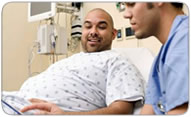Weight Loss Surgery - The Process

 Overview
Overview
 Qualifying
for Surgery as a weight loss option
Qualifying
for Surgery as a weight loss option
 Making an Appointment
Making an Appointment
 Comprehensive
Consultation
Comprehensive
Consultation
 Financial
Considerations
Financial
Considerations
 Preparing for Surgery
Preparing for Surgery
 Life After Surgery
Life After Surgery

Overview
Weight loss surgery is more than the surgery
itself. There is an extensive qualification
process and life long commitment to the lifestyle
changes after the surgery. John J. Feng, M.D.,
FACS provides a comprehensive program that
surrounds the surgery and provides the highest
level of pre and post surgical care.
 Back to top
Back to top
 Appointments
& Contacts
Appointments
& Contacts

Qualifying for surgery as a weight loss option
 Weight
loss surgery is not right for everyone. You
should take in consideration of all the hard work,
lifestyle change and motivation it will take after
surgery. Obesity surgery is an effective
treatment for morbid obesity, although the pounds
do not come off by themselves. The surgery is an
aid to help achieve lasting results by limiting
your food intake.
Weight
loss surgery is not right for everyone. You
should take in consideration of all the hard work,
lifestyle change and motivation it will take after
surgery. Obesity surgery is an effective
treatment for morbid obesity, although the pounds
do not come off by themselves. The surgery is an
aid to help achieve lasting results by limiting
your food intake.
 Learn
more about indications and qualifications for
weight loss surgery candidacy
Learn
more about indications and qualifications for
weight loss surgery candidacy
 Back to top
Back to top
 Appointments
& Contacts
Appointments
& Contacts

Making an Appointment
Please contact our office directly by calling our
Bariatric Surgery
Scheduler at (650) 853-6671.
 Back to top
Back to top
 Appointments
& Contacts
Appointments
& Contacts

Comprehensive Consultation
During your initial consultation,
Dr. Feng will review and evaluate your medical
condition, prior surgeries if any, and
medications as well as any pertinent issues
regarding the appropriate weight loss procedure. A
thorough discussion regarding your surgical
options will be presented that fit your personal
needs.
 Back to top
Back to top
 Appointments
& Contacts
Appointments
& Contacts

Financial Considerations
During your initial Consultation Dr. Feng’s
office staff with discuss the Surgery fees and
help you with Insurance Pre-Authorization as
necessary. Patients should be aware that there
are out-of-pocket expenses, and insurance policies
may cover one type of weight loss surgery and not
another type of surgery. The patient expenses can
vary. Patients should contact their insurance
company to confirm their policy benefits for
weight loss surgery. Certain insurance companies
may even further specify which hospitals that
surgery can take place.
 Back to top
Back to top
 Appointments
& Contacts
Appointments
& Contacts

 Preparing
for Surgery
Preparing
for Surgery
After attending a free Information Seminar, you
will have your initial comprehensive Consultation
with Dr. Feng. Next, you will undergo nutritional
evaluation and learn what you need to know about
staying healthy while losing weight with bariatric
surgery from our Registered Dietician team. Our
behaviorist will help with psychological clearance
for all of our patients. Finally, some health
insurance plans require supporting statements for
Bariatric Surgery by your Primary Care Physician.
These steps often need to be completed in order to
request Insurance Pre-Authorization and usually
takes several months.
In addition, a customized list of Pre-Operative
Testing will also be necessary to prepare for
surgery. Once surgery is approved, you will be
instructed to obtain a Pre-Operative History and
Physical evaluation with your Primary Care
Physician for clearance for general anesthesia for
the upcoming Bariatric Surgery,
Patients are asked to lose some weight prior to
surgery in a healthy manner to optimize the
results of the surgery itself, usually about 10%
of their weight. Pre-Operative weight loss has
been shown to shrink the liver size which may be
enlarged and fatty in an obese person. A grossly
enlarged liver that comes from gaining weight can
interfere with surgery and possibly put the
patient at higher risk for complications.
Patients are asked to stop aspirin and
non-steroidal anti-inflammatory drugs (NSAIDs)
such as ibuprofen, Advil, Motrin, Naproxyn at
least 7 days prior to surgery. Patients on even
stronger blood thinners such as Plavix need to
stop 10 days prior to surgery. Other medications
such as those that treat diabetes should be
adjusted and even stopped the day or 2 prior to
surgery depending on their type. High blood
pressure medications should be taken the morning
of surgery, except for diuretics or water pills.
All alternative-medicine or herbal medications
need to be stopped 7 days prior to surgery.
If you smoke, you need to stop at least 8 weeks
prior to surgery to minimize the chance for lung
failure, poor healing and other very serious,
life-threatening complications. You will be asked
to submit a specific test just prior to surgery to
confirm this.
The path to preparing for Surgery is designed to
evaluate and optimize your medical and mental
health in order to establish the best conditions
under which to perform elective bariatric
surgery. From the time you meet with Dr. Feng, you
goal is to remember that it is the first day on
the road to a healthier life. Bariatric surgery is
only a tool. You have to use the tool properly to
succeed.
To mentally prepare yourself
- Understand the surgical
process and what to expect afterwards.
- Talk to people who have had
weight loss surgery.
- Write a letter to yourself and
your surgeon explaining your reasons for having
the surgery and outlining your plans to maintain
your weight loss after surgery.
- Start a journal about your
experience. Record how you feel now, the
obstacles you encounter, the things you hope to
be able to do after surgery.
- Get a letter of support from
your family. It helps to know you have people
behind you, waiting to help.
To physically prepare yourself, strictly follow
your doctor's guidelines
These usually include, but are not limited to:
- Staying on a carb- and
fat-free liquid diet with protein drink
supplements with vitamins and minerals guided by
the Registered Dietician to shrink your liver
for surgery.
- Restricting yourself to a
clear liquid diet 12-24 hours before surgery.
- Stop smoking for at least 2
months before surgery.
- Be certain to follow your
surgeon's instructions regarding any medications
you may be taking to control other health
conditions.
- Arrive on time, with supplies
from home for an overnight hospital stay. If you
use special equipment for sleep apnea, you
should bring your machine to the hospital.
Routine tests before surgery
 Certain
basic tests are done prior to surgery: a Complete
Blood Count (CBC) and a Chemistry Panel, which
gives a readout of about 20 blood chemistry
values. Often a hemoglobin A1c is done to evaluate
for diabetes, which is very common in overweight
persons. Vitamin D deficiency and evaluation for
calcium defiency are checked. H. Pylori bacteria
exposure is evaluated since this type of bacteria
causes stomach ulcers and other problems. All
patients get an upper GI xray to evaluate your
stomach for a possible hiatal hernia and an
electrocardiogram (EKG), and possibly a chest
xray. Women may have a pregnancy test just to make
sure. Many surgeons ask for a gallbladder
ultrasound if you know you have gallstones. Other
tests, such as pulmonary function testing,
echocardiogram, sleep studies, GI evaluation, or
cardiology evaluation with cardiac stress testing
may be requested when indicated.
Certain
basic tests are done prior to surgery: a Complete
Blood Count (CBC) and a Chemistry Panel, which
gives a readout of about 20 blood chemistry
values. Often a hemoglobin A1c is done to evaluate
for diabetes, which is very common in overweight
persons. Vitamin D deficiency and evaluation for
calcium defiency are checked. H. Pylori bacteria
exposure is evaluated since this type of bacteria
causes stomach ulcers and other problems. All
patients get an upper GI xray to evaluate your
stomach for a possible hiatal hernia and an
electrocardiogram (EKG), and possibly a chest
xray. Women may have a pregnancy test just to make
sure. Many surgeons ask for a gallbladder
ultrasound if you know you have gallstones. Other
tests, such as pulmonary function testing,
echocardiogram, sleep studies, GI evaluation, or
cardiology evaluation with cardiac stress testing
may be requested when indicated.
 Back to top
Back to top
 Appointments
& Contacts
Appointments
& Contacts

Life After Surgery
It is very important that you adhere to the
recommended dietary guidelines that will be
explained in detail in a comprehensive nutrition
manual reviewed with you by the Dieticians. The
modifications that have been made to your
gastrointestinal tract will require permanent
changes in your eating habits that must be adhered
to for a successful weight loss. The following
are some general dietary weight loss surgery
guidelines:
- Don't drink fluids while
eating. Fluids tend to make you feel full before
you have consumed enough food.
- When it is time to start
eating solid food it is essential that you chew
your food thoroughly. You will not be able to
eat steaks or other chunks of meat if they are
not ground or chewed thoroughly.
- Avoid carbonated drinks, milk
shakes, high-calorie nutritional supplements,
high-fat foods and foods with high fiber.
- Limit your snacking between
meals.
- Avoid items with sugar
listed as one of the first three ingredients on
the food labels.
- Avoid alcohol.
- Avoid smoking.
Please note that the dietary guidelines may be
different for each weight loss procedure that is
preformed. For more information, your assigned
Registered Bariatric Dietician will review all
these guidelines and available for questions
throughout your care with Dr. Feng's office staff.
Going Back to Work
Many patients return to full before surgery
levels of activity within 4 weeks of their
procedure. Patients who had minimally invasive
laparoscopic procedure may be able to return to
work and normal activity within 2 weeks. Dr. Feng
will discuss your options and when your can return
to work.
Follow-up testing after Surgery
There are still long-term effects on nutrition,
over time you will need periodic checks for anemia
and vitamin B-12, folate, and iron levels.
Follow-up tests will be conducted every 3-6 months
or as needed, and then every couple of years.
Support Groups
There are many weight loss program support
groups provided to patients with excellent
opportunities to discuss their personal and
professional issues. Weight loss surgery will not
resolve immediate existing emotional issues or
heal the years of damage that obesity might have
inflicted on your well being.
Dr. Feng has resources to assist you with short
term and long term questions and needs. Dr. Feng
has ongoing post-surgical support groups moderated
by our psychologist or behaviorist and dieticians
to produce the greatest level of success for our
patients.
The Importance of Support from friends and
family:
The changes in your diet and lifestyle after
surgery will last a lifetime. And you'll have a
greater chance of long-term success if you
surround yourself with people who understand and
support your goals.
Things you can do
- Help your friends and family
members understand why you've chosen a surgical
solution. Many people are under the impression
that weight loss surgery is an experimental
treatment rather than one with more than 40
years of history. Direct them to this web site
or others in our Additional Resources section.
It's important that they understand that morbid
obesity is a disease and that diets don't work
for you.
- People who are morbidly obese
often report that their spouses, or others close
to them, seem to discourage weight loss. These
people see your weight as part of your identity.
Understand that this is a fear of change.
Discuss your reasons for having surgery. They
need to know that your health is at stake and
you will be counting on them to help you during
and after surgery.
- Attend support groups in your
area and bring your family and friends to help
them understand. Your surgeon's office will help
you here. The free informational seminar is
another venue to show your support network what
you are going to be going through. Surround
yourself with people who share your situation.
Ask questions and receive answers in a
supportive environment. Form a network to share
recipes and exercise tips. It's important for
you to know that you are not alone. There are
knowledgeable, friendly people available to
support and help you.
 Back to top
Back to top
 Appointments
& Contacts
Appointments
& Contacts
 Weight
loss surgery is not right for everyone. You
should take in consideration of all the hard work,
lifestyle change and motivation it will take after
surgery. Obesity surgery is an effective
treatment for morbid obesity, although the pounds
do not come off by themselves. The surgery is an
aid to help achieve lasting results by limiting
your food intake.
Weight
loss surgery is not right for everyone. You
should take in consideration of all the hard work,
lifestyle change and motivation it will take after
surgery. Obesity surgery is an effective
treatment for morbid obesity, although the pounds
do not come off by themselves. The surgery is an
aid to help achieve lasting results by limiting
your food intake. Preparing
for Surgery
Preparing
for Surgery  Certain
basic tests are done prior to surgery: a Complete
Blood Count (CBC) and a Chemistry Panel, which
gives a readout of about 20 blood chemistry
values. Often a hemoglobin A1c is done to evaluate
for diabetes, which is very common in overweight
persons. Vitamin D deficiency and evaluation for
calcium defiency are checked. H. Pylori bacteria
exposure is evaluated since this type of bacteria
causes stomach ulcers and other problems. All
patients get an upper GI xray to evaluate your
stomach for a possible hiatal hernia and an
electrocardiogram (EKG), and possibly a chest
xray. Women may have a pregnancy test just to make
sure. Many surgeons ask for a gallbladder
ultrasound if you know you have gallstones. Other
tests, such as pulmonary function testing,
echocardiogram, sleep studies, GI evaluation, or
cardiology evaluation with cardiac stress testing
may be requested when indicated.
Certain
basic tests are done prior to surgery: a Complete
Blood Count (CBC) and a Chemistry Panel, which
gives a readout of about 20 blood chemistry
values. Often a hemoglobin A1c is done to evaluate
for diabetes, which is very common in overweight
persons. Vitamin D deficiency and evaluation for
calcium defiency are checked. H. Pylori bacteria
exposure is evaluated since this type of bacteria
causes stomach ulcers and other problems. All
patients get an upper GI xray to evaluate your
stomach for a possible hiatal hernia and an
electrocardiogram (EKG), and possibly a chest
xray. Women may have a pregnancy test just to make
sure. Many surgeons ask for a gallbladder
ultrasound if you know you have gallstones. Other
tests, such as pulmonary function testing,
echocardiogram, sleep studies, GI evaluation, or
cardiology evaluation with cardiac stress testing
may be requested when indicated.